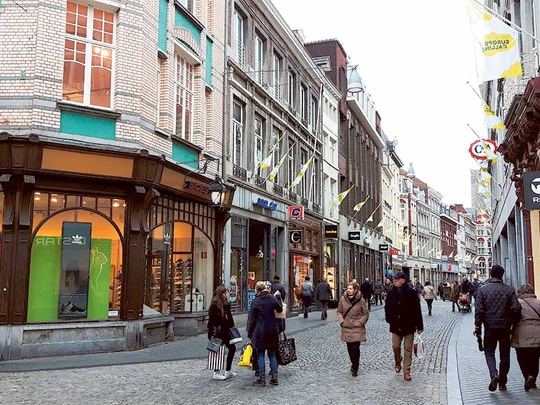
Maastricht, Netherlands: Maastricht, a picturesque Dutch city of cobblestone streets and medieval arches, on Tuesday marks the 25th anniversary of the European treaty bearing its name, showing rare optimism and hope amid rising Euroscepticism.
Sandwiched just a few kilometres between Liege, in Belgium, and Aachen, in Germany, this southern provincial capital bore witness more than two decades ago to the birth of an audacious plan to integrate Europe’s countries into one union.
On February 7, 1992, the whole town was swept up in the euphoria of the moment, recalled Limburg’s provincial governor, Theo Bovens.
“You could feel the pro-Europe atmosphere,” he said.
“Every shopping street was linked to one country,” he said — one for Belgium, another for Germany and yet another for Britain. “Shopkeepers decorated their street with goods and flags.”
On that day, in a new provincial building on the banks of the River Maas, the 12 nations of the then European Economic Community signed the Maastricht Treaty, which paved the way for the foundation of today’s European Union (EU) and the single currency, the euro.
Twenty-five years on, after a series of crises — a plummeting euro, Greece’s political and economic woes, a wave of immigration unprecedented since the Second World War and Brexit — Maastricht and its 120,000 inhabitants feel the city still has an essential, even existential, role to play.
“I think we should try to light the candle again, this little spark that still is there, to make sure that this European dream that we had 25 years ago is going to be a dream again and not the nightmare that we are fearing now,” said Maastricht mayor Annemarie Penn-te Strake.
“Because this is the Maastricht treaty we feel indebted and have to pay attention to the fact that we are living in an era in which Europe ... has a lot of problems, a lot of scepticism, and a lot of anger.”
Local authorities are pleading for a return to the ideals and values enshrined in the treaty, which they fear too many EU members have become disconnected from.
They yearn for a renewed embrace of the idea of European citizenship, for a better focus on improving working and living conditions, and to change labyrinthian structures that have become too institutional.
Nestling in the crossroads of three countries, in what it calls the “euregion,” the small province will soon send to Brussels a programme of ideas culled from a year of debates on how to reconstruct Europe in an organic fashion from the ground.
“We don’t need less of Europe, we need another Europe,” said Bovens, criticising those countries he sees as still too inward-looking.
On Maastricht’s main square, where the smell of frying doughnuts mingles with that of roasted chicken and carnival music tangles with a riot of different languages, locals appear to have kept faith.
Here the EU is seen as a bulwark against the current international climate of anxiety.
“When I see all these changes happening in the United States, I think it’s a good thing that the European dream still exists,” said grocer Fabien Ruiter, 23.
To those filled with doubt and tempted to retreat behind national borders, 19-year-old Esmee insisted “migration will still be a problem whether you are still in Europe or not.”
But Tine Raenarts, 54, standing at a table in the market square, remained unconvinced.” I have always had my doubts about Europe,” she said.
Charting a path towards a stronger EU is indeed a difficult task in “this Europe which is bigger, but also more divisive,” said Sophie Vanhoonacker, an expert in European affairs at Maastricht University.
“Political leaders must step up and shoulder their responsibilities, but it is not certain they will,” she said.
The same dilemma faced their predecessors in 1992. Even as the birth of a new Europe was feted on the cobblestone streets of Maastricht, uncertainty shrouded the historic moment after the fall of the Berlin Wall and the collapse of the Soviet bloc.
In the end, European leaders opted for a message of hope as their signatures lent a flourish to their positive and bold plan.
But now this dream unveiled a quarter century ago can either be rekindled, or die.
“The key rests with the member states, not with Brussels,” said Vanhoonacker.












